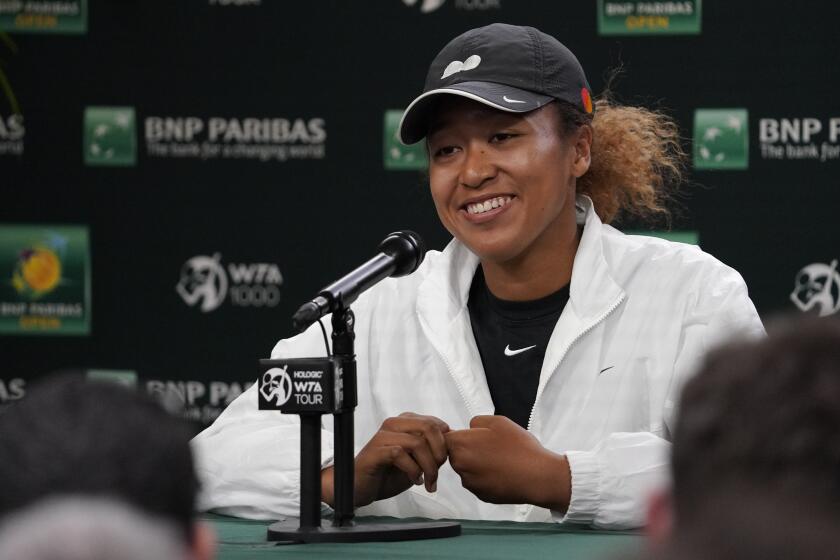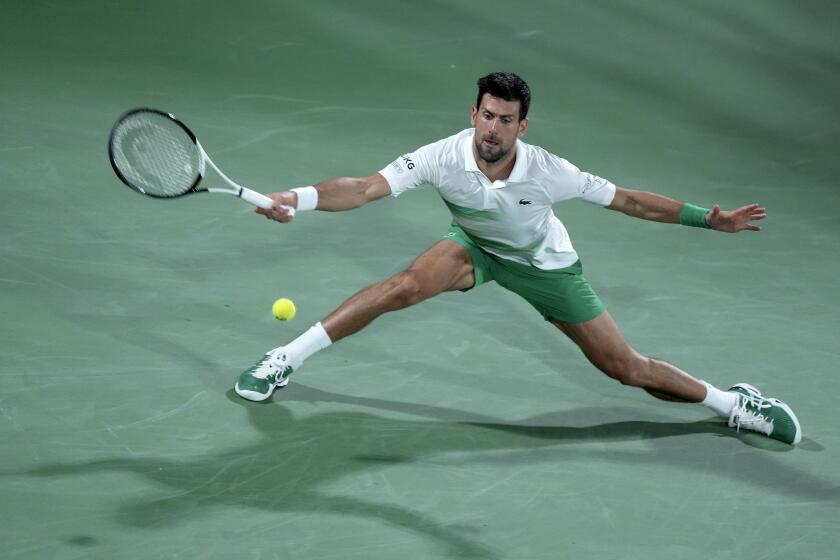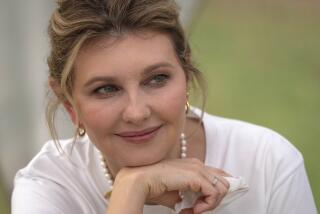Column: Indian Wells players united in their disgust over the war in Ukraine
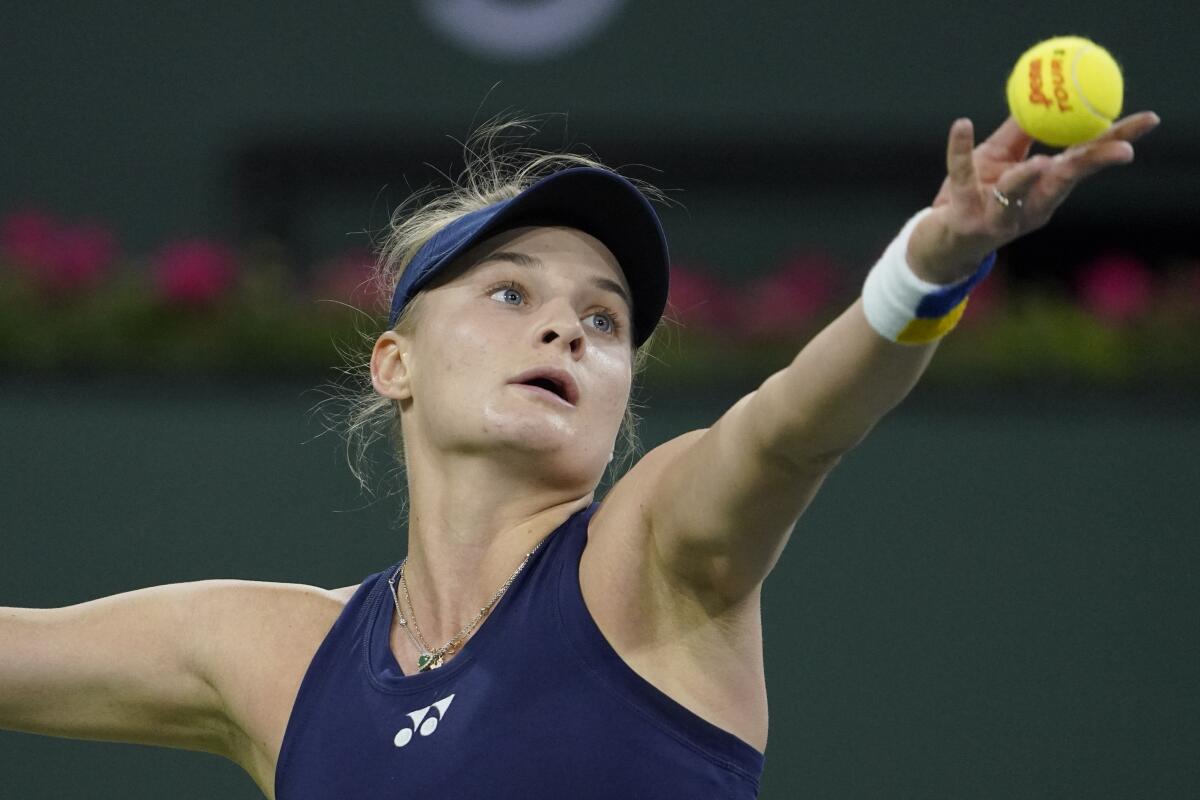
INDIAN WELLS — The message was conveyed in small letters printed unevenly but defiantly on the side of Russian tennis player Anna Kalinskaya’s right shoe. NO WAR, the words said in black ink that stood out starkly against a bubblegum-pink background.
The message came across loud and clear when Dayana Yastremska of Ukraine, who had spent two nights in an underground parking garage in her hometown of Odessa to escape Russian attacks before her parents sent her and her younger sister Ivanna to safety in France, had a Ukraine flag draped around her shoulders when she walked out to the court at Stadium 1 for her first-round match at the BNP Paribas Open on Wednesday.
“You still have a lot of thoughts about it. You still think a lot about it,” said Yastremska, who arranged the flag around her shoulders again as she left the court after Caroline Garcia outlasted her 6-4, 6-7 (8), 7-5.
Iga Swiatek of Poland, the No. 3 women’s seed at the Indian Wells tournament, sent her a message via social media. She promised that in her matches here she will wear a small ribbon in the blue and yellow colors of Ukraine’s flag because “I want to show, even if symbolically, my solidarity with Ukraine.” She recommended contributing to humanitarian aid organizations, including the Polish Red Cross, and added, “I am against this war and the suffering of innocent people.”
Russia’s horrifying invasion of Ukraine was on the minds of many players as competition began Wednesday. The main governing bodies of tennis had decreed players from Russia and Belarus — which has supported Russia’s aggression — wouldn’t be allowed to display their nation’s flag, but that’s little more than a slap on the wrist.
Naomi Osaka enters the BNP Paribas Open with confidence she can enjoy tennis again after sharing her mental health struggles last year.
And as men’s world No. 1 Daniil Medvedev pointed out, Russian players are accustomed to competing under a neutral flag at the Olympics in the wake of Russia being banned from the Games as the consequence of its state-run doping schemes. “At least we can play,” said Aryna Sabalenka of Belarus, the No. 2 women’s seed.
Prohibiting players from those countries from competing in tournaments would be the next and more drastic step. That idea has occurred to Medvedev, he acknowledged Wednesday.
“We never know,” he said during a pretournament news conference. “The way the situation is evolving in other sports, some sports made this decision, especially the team sports. Tennis is probably one of the most individual sports we have in the world. Everybody has his own team, many times from different countries. Out of top 100 players everybody’s living in so many different places.
“There is always a possibility, but I hope not.”
Sabalenka said she would be willing to wear a ribbon showing support for the people of Ukraine.
“I can wear it and I don’t feel bad wearing it,” she said. “I feel people need our support. The word sad is not the right word. We all care about them and we all hope for the best and for the peace and wearing the ribbon there’s nothing bad about it. I’ll be comfortable wearing it.”
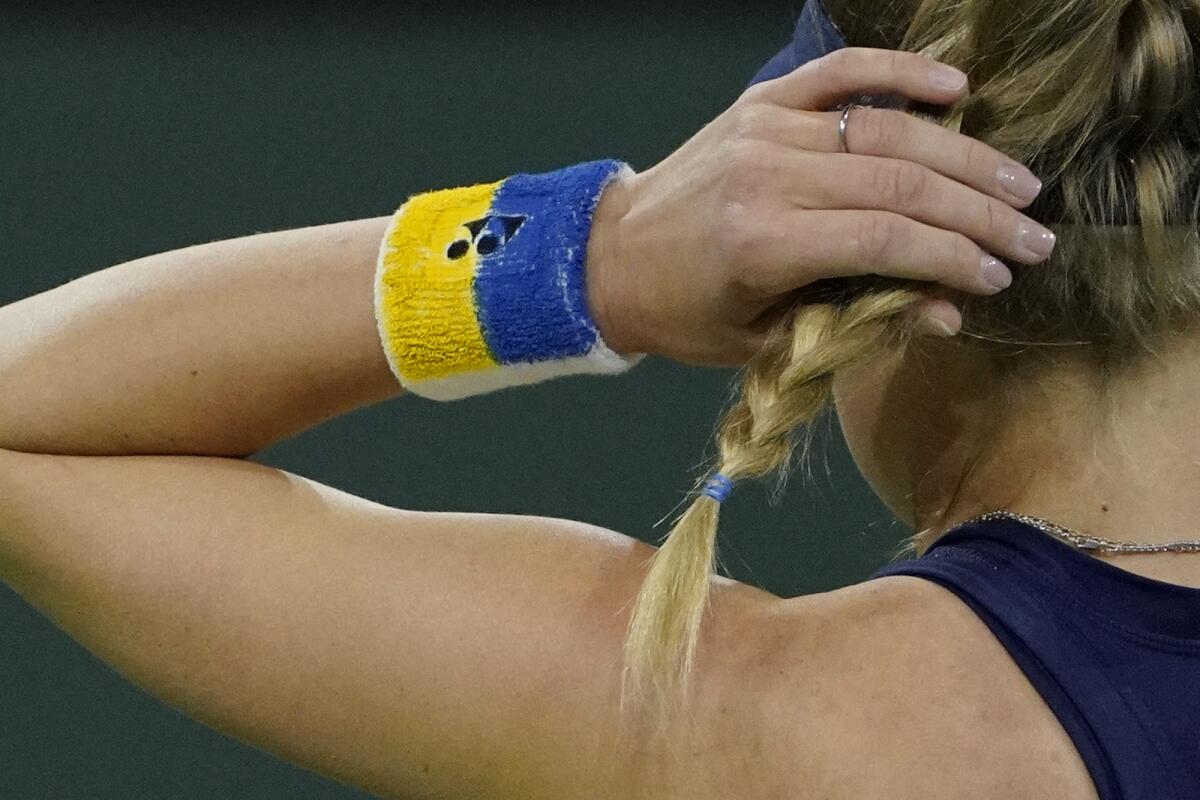
She also said she hadn’t heard any harsh words from Ukrainian players, but the atmosphere in the locker room is more tense than in the past.
“I think they understand that there’s nothing we can do about it,” she said. “I still speak with all girls and we’re still kind of friends but right now everyone is kind of worried and it’s not like everyone is happy inside our area, like it used to be. We still talk to each other. It’s not conflict between us.”
Buoyed by adrenaline and a determination to represent her country well, Yastremska reached the final of a tournament in Lyon, France, last week and was given a wild-card spot here. The journey to the United States exhausted her. She saved two match points in the second set against Garcia but she ran out of energy, understandably succumbing to physical and mental exhaustion.
“It was really nice to play here. I really love this tournament,” said Yastremska, who’s ranked 103rd in the world after peaking at No. 21 in January of 2020. “I felt like I wasn’t really prepared.”
Novak Djokovic said he won’t play in the BNP Paribas Open at Indian Wells after learning he won’t be able to enter the U.S. because he is not vaccinated against COVID.
She has had to grow up too fast, tearfully leaving behind her parents, Oleksander and Marina, and becoming the guardian of her 15-year-old sister. They’ll team up in doubles here. They’re still fearful about their parents and friends back home, but at least the sisters will be together and safe. “It’s kind of sad but I have to continue,” Yastremska said. “I have to play and I have to keep myself up.”
From the rubble of something terrible some small bits of good have emerged. Andy Murray pledged to give the rest of his 2022 earnings to UNICEF for aid to Ukraine. Swiatek has found her voice, emerging as a leader of the generation that is taking over women’s tennis.
“I still want sports to connect people,” she said. “Today it can connect in helping and standing against the war, in actions that we are able to take.”
Amen.
More to Read
Go beyond the scoreboard
Get the latest on L.A.'s teams in the daily Sports Report newsletter.
You may occasionally receive promotional content from the Los Angeles Times.

